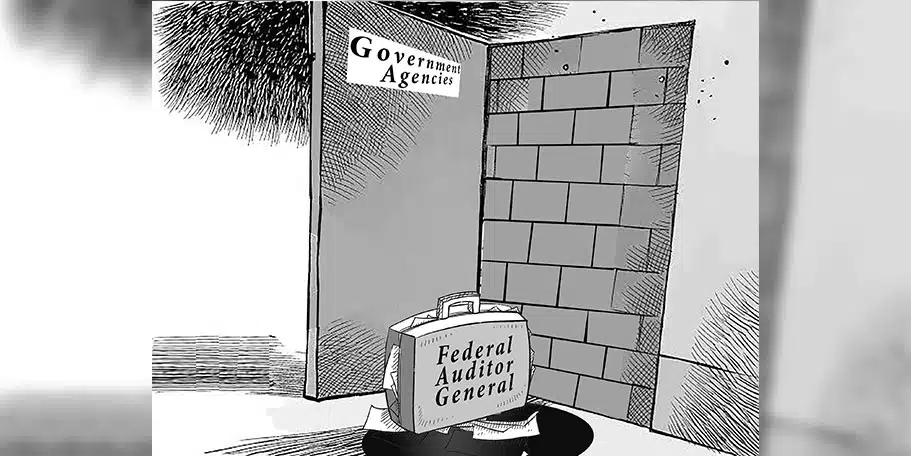
The theme of this editorial is a subject we perennially address around this time of the year. The Federal Auditor General (FAG’s) recent report to Parliament of its financial, performance and legal audit findings into the accounts of ministries and other agencies of the federal government for the 2023-2024 fiscal year exposed significant financial irregularities and mismanagement across various federal institutions for the reporting period. Key findings include substantial purchases made without following proper procurement procedures; the existence of substantial amounts of unpaid receivables, unreconciled payments, and unsubstantiated expenditures, totaling billions of Birr; and irregularities in procurement processes. The report also revealed that a tiny percentage of mismanaged public funds were recovered on the basis of its recommendation the previous year, underscoring the need to ramp the efforts in this regard. Even more alarming is the revelation that some of its staff was subjected to threats and harassment while doing their job.
In any functional democracy or developing nation committed to good governance, accountability and transparency are foundational pillars. Central to these pillars in Ethiopia is the Federal Auditor General, an institution tasked with scrutinizing government spending, ensuring fiscal discipline, and safeguarding public resources. Yet, despite its critical role, it often struggles to receive the respect, independence, and authority vital to fulfilling its mandate effectively. It is imperative that the Ethiopian government recognizes the importance of empowering and respecting this institution, not only to enhance transparency but to build a resilient, accountable government that serves its citizens’ interests.
The role of the FAG is vitally important. It is the watchdog that monitors the utilization of public funds and government assets. Its findings provide the basis for holding public officials accountable, exposing corruption, and improving public financial management. An independent and respected Auditor General is instrumental in deterring corrupt practices, ensuring efficient resource allocation, and fostering public trust in government operations. In Ethiopia’s context—where development challenges often intertwine with corruption, mismanagement, and resource leakages—its role is even more critical. It acts as a safeguard against maladministration and a catalyst for reform. When its reports are taken seriously and acted upon, they can lead to meaningful reforms, foster transparency, and bolster citizens’ confidence in public institutions.
Regrettably, the FAG continues to face a raft of hurdles that inhibit its effectiveness. Historically, it has lacked the full independence necessary to operate without undue influence from executive or political actors. When its reports are dismissed, ignored, or politicized, its capacity to function as an effective oversight body diminishes. To make matters worse, its officials and staff frequently encounter bureaucratic resistance, limited resources, and sometimes intimidation tactics aimed at discouraging independent reporting. Such challenges severely undermine the office’s authority and send a message that oversight is optional rather than essential. This lack of respect equates to a weakening of Ethiopia’s overall governance framework, leaving room for misuse of public funds and the erosion of public trust.
Disregarding or underestimating the FAG’s significance comes at a heavy cost. Without proper oversight, government procurement processes become vulnerable to corruption, leading to inflated costs and substandard projects. Mismanagement of funds can divert vital resources away from health, education, infrastructure, and social services—ultimately impacting the wellbeing of ordinary citizens. Most crucially, when the public perceives that corruption and misappropriation are unchecked, social discontent and cynicism grow. Citizens become skeptical of government promises and institutions designed to serve their interests, weakening social cohesion and democratic participation. Ethiopia’s progress toward good governance, economic growth, and sustainable development hinges on giving oversight bodies the respect and operational independence they deserve.
Respect for the Federal Auditor General is not merely an institutional matter; it is a strategic necessity for Ethiopia’s democratic consolidation and development agenda. An independent, well-respected FAG signals a government’s genuine commitment to transparency and accountability. It fosters an environment where public officials are more cautious in their use of resources, knowing that their activities are subject to objective scrutiny. Moreover, respect for the office can strengthen Ethiopia’s international reputation. Donors and development partners prioritize good governance and anti-corruption measures when deciding to provide aid and investments. Demonstrating that the government values transparency institutions encourages increased support and cooperation on development initiatives.
The Ethiopian government stands at a crossroads. It can continue to role pay lip service to the pivotal the Federal Auditor General plays in promoting accountability, transparency, and effective public financial management, weakening its own accountability framework and risking further social unrest—or it can elevate this institution as a pillar of good governance. Respect for the FAG is a litmus test for Ethiopia’s commitment to transparency, integrity, and democratic consolidation. Unfortunately, the failure of Parliament to go beyond declaring that it will take “legal, political, and administrative measures” against institutions that do not implement the FAG’s recommendations and hold anyone who does not implement affirms that it has virtually slid into irrelevance. It is thus high time for all stakeholders to recognize that an effective, independent, and well-respected Auditor General is not a luxury but a cornerstone of democracy and good governance for Ethiopia.
.
.
.
#Auditor #General #Respect #Deserve
Source link











